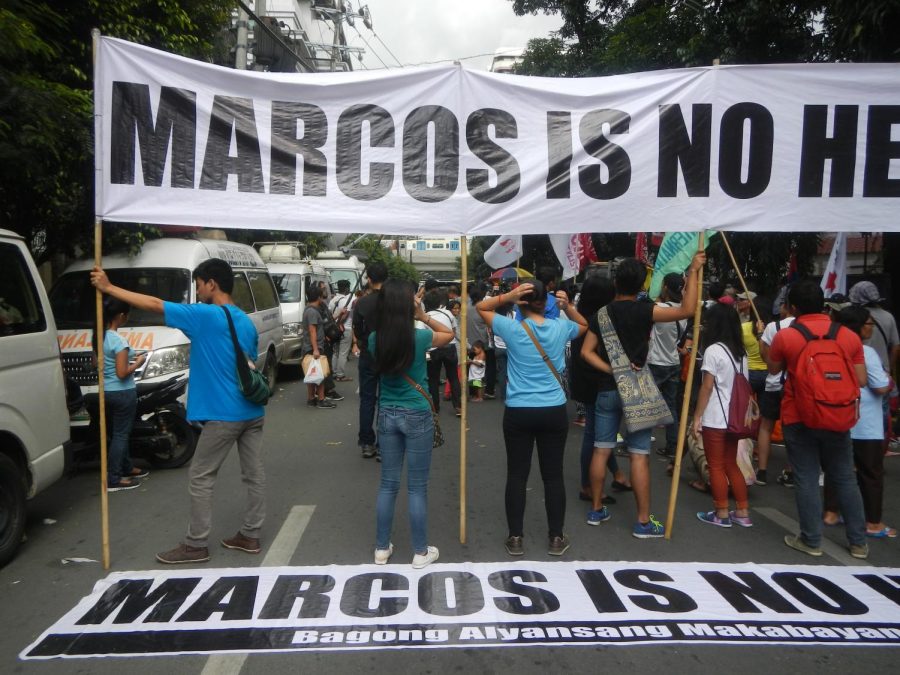Ferdinand Marco Jr. is the Philippines New President, and Many are Worried
Many have protested against the Marcos families rule after the hardships faced by many Filipinos. Image via. Wikimedia Commons
May 16, 2022
Ferdinand “Bongbong” Marco Jr. is now the new president of the Philippines after winning the election by a landslide, according to unofficial results.
The partial and unofficial results showed Marcos Jr. winning with more than 30 million votes, double what his closest possible rival received.
“This election is so consequential because whoever wins will decide who lives and who dies in the Philippines,” said Nicole Curato, a sociologist and professor at the University of Canberra in Australia. And despite winning the vote with incredible numbers, many Filipinos are surprised by his win and worried about the future of democracy in the Philippines.
Marcos Jr. is a member of one of the country’s most infamous political families. Critics of Marcos have pointed to a widespread disinformation campaign that has grown massively through social media and has whitewashed the history of the Marcos era.
From 1965 to 1986, Ferdinand Marcos Sr. ruled the Philippines. His reign is considered the Marcos era, with tens of thousands of people being imprisoned, tortured, or killed. Along with its restrictions on civil rights, and cruel military police, the Marcos era was also known for its widespread corruption, stealing around $10 billion from the Filipino people.
The Marcos family took the money from the citizens and lived a lavish lifestyle with it while in power. While millions of Filipinos suffered from debt and were stuck in poverty, the Marcos family spent money on expensive artwork, oversea properties, and jewels. Former first lady Imelda Marcos was even widely known for her extravagance and excess spending.
While some citizens say that the Marcos were helpful and built major infrastructure projects and public amenities, the projects were built on funds from widespread corruption, foreign loans, and growing debt.
The Marcos family has denied using any of the state funds for their use, as critics state, and Marcos Jr. has not acknowledged any of the abuses done during his father’s dictatorship.
Few critics have said that Marcos Jr. has only benefited from the unfairly obtained wealth. In a recent interview with CNN affiliate CNN Philippines, he said: “My parents would never let us forget: this is not yours, this is from the people. Everything we have, all the advantages we have gained, any successes, and any comfort or privilege we enjoy comes from the people.”
In Philippine politics, power is typically concentrated in the hands of a few elites and influential families, such as the Marcos’. Marcos Jr.’s sister Imee Marcos is a senator, his mother Imelda, was a four-time congresswoman, and his son, Sandro, was elected as a congressional representative in 2022.
US President Joe Biden congratulated Marcos Jr. on his election win according to a White House readout which said: “President Biden underscored that he looks forward to working with the President-elect to continue strengthening the US-Philippine Alliance, while expanding bilateral cooperation on a wide range of issues, including the fight against Covid-19, addressing the climate crisis, promoting broad-based economic growth, and respect for human rights”
China’s President Xi Jinping also congratulated Marcos Jr. on his win, but lawmakers in Southeast Asia have expressed more concern than congratulations, worried about human rights under the Marcos administration.
“The generalized spread of disinformation has created an environment which has made it difficult for many voters to make informed decisions at the polling station,” said Charles Santiago, a Malaysian lawmaker and chairperson of the ASEAN Parliamentarians for Human Rights. “Even though the electoral process has been conducted in a formally correct manner, we are concerned that voting choices based on lies and harmful narratives could have seriously undermined the integrity of the elections and democracy itself.”
These harmful narratives are typically formed through social media, where misinformation can be found everywhere. The Marcos family who led the Philippines through a cruel dictatorship is now being upgraded and portrayed through songs and emojis. Through social media, one of what was the Philippines’ most despised families is being transformed into one of its most respected.
Disinformation through social media has spread false claims such as that no arrests were made under Marcos’s martial law, and that no cases were filed against the Marcos family in court. Through TikTok many have glorified and romanticized the family, posting photos and videos with music and captions to serve as entertainment and gain sympathy.
While the original Marcos era ended in the 1980s, many campaigners are worried for the future of the country as the family never took accountability for their misdeeds and numerous abuses against the country. They fear that with Marcos Jr. as president, any effort to settle past injustices would vanish.
The unsettled estate tax of the Marcos family is estimated to now be $3.9 billion, with citizens afraid that Marcos Jr. would only get rid of any of this debt.
Marcos Jr. has said he would expand the Presidential Commission on Good Government (PCGG) and tackle corruption, but many are not sure if he will stay true to his words.
Ferdinand Marcos ruled over a time in the Philippines when they had martial law in place. Martial law is the imposition of direct military control of normal civil functions. When he declared martial law, Marcos claimed that he had done so in response to the “communist threat” posed at the time.
11,000 victims of martial law abuses have received some financial compensation for their struggles, but only represent a fraction of all victims.
“There is no more justice to hope for if Marcos Jr. becomes President,” said Bonifacio Ilagan, co-convenor of the group Campaign Against the Return of the Marcoses and Martial Law.
Marcos has also been said to have “portrayed the victims of human rights violations as money-seeking opportunists,” as said by the human rights group Karapatan’s secretary-general, Cristina Palabay.
Rodrigo Duterte, former Filipino president had an administration that was strict when it came to civil society and the media, unfairly accusing tax evasion charges on anyone who challenged the government’s policies and claims, and arresting editors. Some fear that Marcos will go down the same path, and make it harder to hold those in power accountable for any of their wrongdoings.
“The greater concern that Filipinos have has to do with the next six years. What will the economy look like in the next six years? What will happen to civil society? Will there be a clampdown on press freedom? And will the administration wipe out martial law in the curriculum? These are just some of the questions — and these are fundamental ones — for those who resisted the Marcoses’ return to power,” said Cornelio, associate professor and director of development studies at the Ateneo de Manila University.







